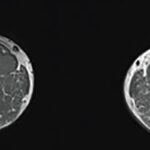PHILADELPHIA—Approximately 100 research abstracts on axial spondyloarthritis (axSpA) were accepted for presentation at ACR Convergence 2022. It is exciting to see a wealth of research on axSpA being undertaken worldwide. Here, we highlight important points from 10 of these studies. 1. Abstract 0378: Prevalence of Axial Spondyloarthritis (axSpA) in Patients Treated for Chronic Back Pain…









